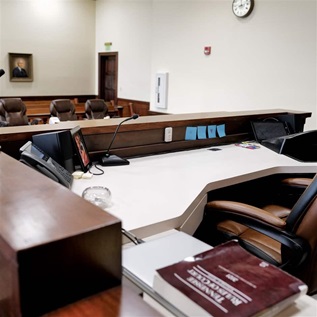Overcrowded Court Dockets, Lack of Family Services Keeping Children in Foster Care, Says New Survey of Family Court Judges
Overloaded court dockets, a chronic shortage of available services for families and poorly prepared caseworkers are significant barriers to finding safe, permanent homes for children in foster care and significant sources of frustration for judges, according to a new national survey of more than 2,200 U.S. judges who hear child abuse and neglect cases released today. The survey was sponsored by Fostering Results, a nonpartisan, national foster care public education project, in partnership with the National Center for State Courts and the National Council of Juvenile & Family Court Judges.
"Judges are often hesitant to talk outside the courtroom about their problems and concerns inside the courtroom," said retired Judge Nancy Sidote Salyers, former Presiding Judge of the Cook County (IL) Juvenile Court's Child Protection Division and Co-Director of Fostering Results. "The large number of judges who responded to our survey and their remarkable candor paint an unprecedented ‘judges-eye-view' of the challenges facing our nation's child welfare system."
The survey provides an extensive look at how judges who hear child dependency cases view their own courtrooms and hurdles to providing permanent families for children in foster care. Among the key findings of the judicial survey:
- Overcrowded court dockets delay finding safe, permanent homes for children in foster care, according to a majority (52%) of judges for whom abuse and neglect cases make up more than a quarter of their dockets. Among judges whose docket is composed of more than three-quarters abuse and neglect cases, nearly two-thirds (64%) say overcrowded dockets delay permanency.
- Barely half (49%) of all judges who hear abuse and neglect cases received any specialized training in child welfare issues prior to hearing child abuse or neglect cases.
- When asked to rank their number one frustration with the child welfare system, forty-six percent (46%) of respondents--by far the largest percentage--ranked the lack of available services for families and children in need as their greatest frustration. Overcrowded court dockets (17%) and poorly prepared caseworkers (12%) were also singled out by some judges as their number one frustration.
- On a more positive note, the majority (58%) of respondents have more than six years experience with abuse and neglect cases and, despite an admitted lack of advance training in child welfare issues, eighty-one percent (81%) report receiving child welfare training over time and more than ninety-two percent (92%) of judges believe they currently have the tools and information necessary to decide the issues presented in dependency cases.
The opinions of the judges reflected in the survey validate earlier findings by nonpartisan and government organizations about the current problems facing America's dependency courts. A 1999 study by the General Accounting Office (GAO) suggested that those that move children swiftly to permanent homes do so in part because they carefully track the progression of children's cases to identify bottlenecks that lead to delay and hold judges accountable for cases on their docket. In May 2004, the Pew Commission on Children in Foster Care released recommendations aimed at improving case management and training among the nation's family court judges.
"These survey results are among the most persuasive evidence to date that judges believe overcrowded dockets, insufficient hearing time, and lack of services interfere with the courts' ability to ensure safe, stable, and permanent homes for children in foster care," said Mark Testa, Director of the Children & Family Research Center and Associate Professor at the School of Social Work, University of Illinois, Urbana-Champaign.
The mail-in survey was conducted in March and April of 2004 and was sent to 5,149 judicial officers nationwide. Overall, 2,241 responses were returned for a response rate of 43.5%. Judges were guaranteed that their individual responses would be confidential and that results would only be shared in the aggregate.
Fostering Results is a national, nonpartisan public education and outreach project to raise awareness of issues facing children in foster care, funded by a grant from The Pew Charitable Trusts to the Children & Family Research Center in the School of Social Work at the University of Illinois, Urbana-Champaign.











